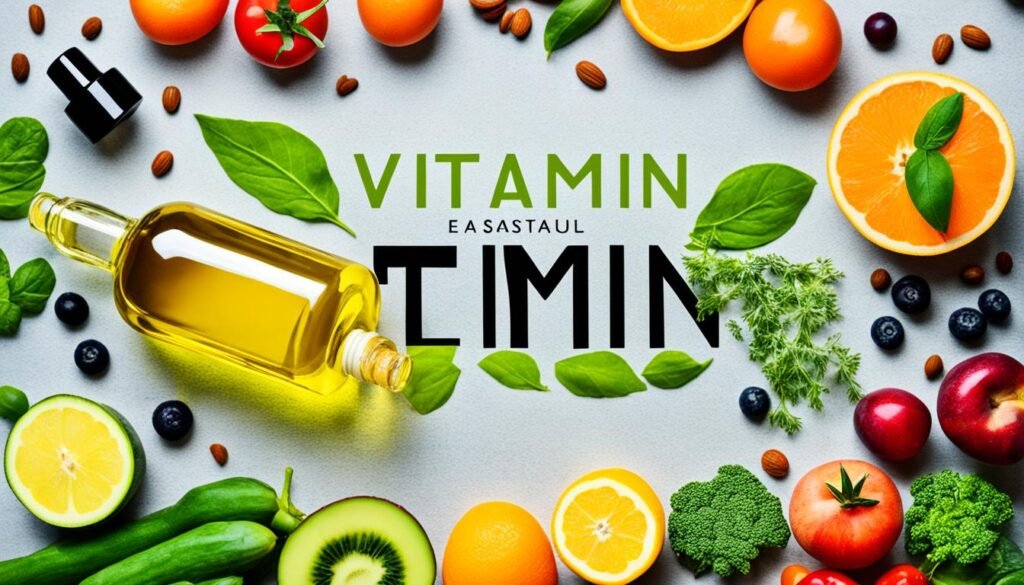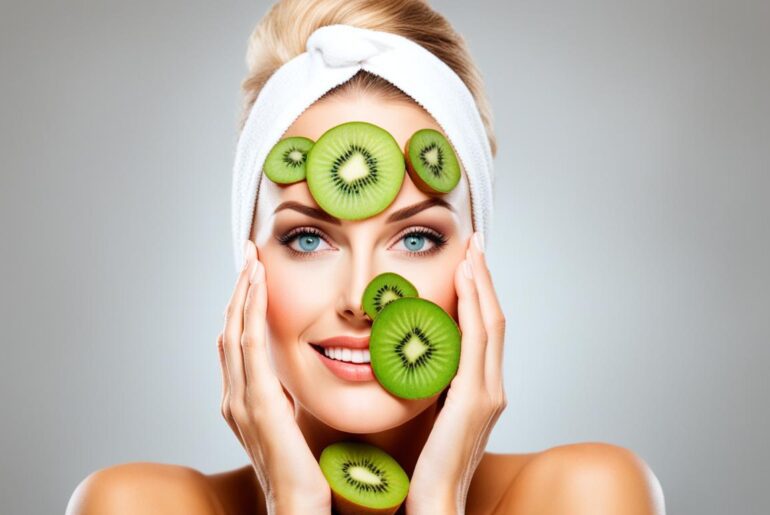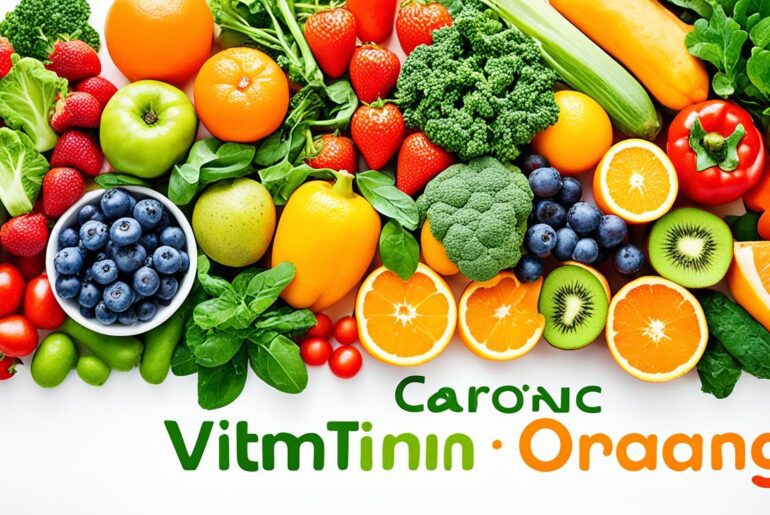Have you ever wondered how to achieve healthy, glowing skin? Is there an effective way to enhance your skin’s appearance naturally? Well, I have some exciting news for you! The answer may lie in a simple and often overlooked solution: vitamins.
Yes, vitamins! These essential nutrients play a crucial role in promoting skin health and can help you achieve that radiant complexion you’ve always desired. But which vitamins should you focus on? How do they work? And can they really make a difference?
In this article, I will reveal the best vitamins for healthy skin and explain how they can enhance your skin’s appearance and overall well-being. Get ready to unlock the secrets of skin-boosting vitamins and discover a new way to nourish and rejuvenate your skin naturally.
So, are you ready to embark on a journey to healthier, more vibrant skin? Let’s dive in!
Key Takeaways:
- Proper nutrition is essential for maintaining healthy and vibrant skin.
- Vitamins play a crucial role in enhancing skin health by promoting hydration, collagen production, and protection against external factors.
- Vitamin A, C, E, and D are some of the key vitamins that can have a significant impact on skin health.
- Including vitamin-rich foods in your diet can help improve your skin’s overall appearance and well-being.
- While a balanced diet is the best way to obtain vitamins, supplements can be considered under professional guidance.
The Importance of Nutrition for Skin Health
A healthy diet is essential for maintaining skin health. Your skin relies on a variety of nutrients to function properly, including vitamins, minerals, and antioxidants. Adequate consumption of these nutrients helps keep the skin moisturized, firm, and protected against damage. Nutritional deficiencies can lead to dryness, inflammation, and accelerated aging of the skin. Therefore, focusing on a well-rounded diet that includes skin-boosting vitamins is crucial for achieving and maintaining healthy skin.
Proper nutrition plays a key role in supporting the overall health and appearance of your skin. The impact of diet on skin is significant, as the nutrients you consume directly affect the condition of your skin. Without a well-balanced diet, your skin may become dull, dry, and prone to issues such as acne and premature aging.
By incorporating nutrient-rich foods into your diet, you can nourish your skin from within and enhance its natural beauty. Vitamins, minerals, and antioxidants found in fruits, vegetables, whole grains, and lean proteins have specific roles in supporting skin health:
Vitamins for Skin Health
| Vitamin | Role in Skin Health | Food Sources |
|---|---|---|
| Vitamin A | Supports skin rejuvenation, collagen production, and protection against UV damage | Carrots, sweet potatoes, spinach, salmon |
| Vitamin C | Promotes collagen synthesis, brightens the skin, and provides antioxidant protection | Citrus fruits, berries, bell peppers, kale |
| Vitamin E | Moisturizes the skin, protects against oxidative stress, and aids in skin repair | Nuts, seeds, avocados, olive oil |
| Vitamin D | Supports skin cell growth and helps maintain skin health | Fatty fish, fortified dairy products, mushrooms |
In addition to vitamins, minerals such as zinc and selenium, along with amino acids, also play important roles in maintaining healthy skin. Zinc aids in wound healing and supports the structure of skin cells, while selenium provides antioxidant protection. Amino acids are essential for collagen production and skin rejuvenation.
Proper nutrition is the foundation for healthy and glowing skin. The impact of diet on skin health cannot be underestimated. By consuming a variety of nutrient-rich foods, you can support your skin from within and achieve a radiant complexion.
Remember, healthy skin starts with a healthy diet. Incorporate a wide range of fruits, vegetables, whole grains, lean proteins, and healthy fats into your meals to provide your skin with the essential nutrients it needs. Combined with a good skincare routine, nutrition can contribute to overall skin health and a youthful appearance.
Vitamin A for Skin Rejuvenation

Vitamin A is a powerhouse nutrient for skin rejuvenation, offering a multitude of benefits that can enhance the health and appearance of your skin.
One of the key roles of vitamin A is its ability to promote collagen production. Collagen is a vital protein that provides the skin with structure and elasticity, helping to reduce the appearance of wrinkles and fine lines. By increasing collagen synthesis, vitamin A helps to maintain a youthful and vibrant complexion.
Moreover, vitamin A plays a crucial role in protecting the skin from sun damage. When exposed to UV rays, collagen can break down, leading to premature aging. Vitamin A acts as a shield, interrupting this breakdown process and supporting collagen integrity, keeping your skin supple and firm.
In addition to its rejuvenating benefits, vitamin A is also known for its oil-regulating properties. This can be particularly beneficial for individuals with oily or acne-prone skin, as it helps to control sebum production and prevent clogged pores.
Furthermore, vitamin A aids in the healing process of cuts and scrapes, promoting faster tissue repair and reducing the risk of infection. It also helps prevent dryness and itching, ensuring your skin stays hydrated and comfortable.
To incorporate more vitamin A into your diet, consider adding foods such as leafy greens, eggs, and fish to your meals. These sources are rich in this skin-boosting nutrient and can help improve the overall health and appearance of your skin.
The benefits of vitamin A for skin:
- Promotes collagen production, reducing wrinkles and fine lines
- Protects against sun damage and premature aging
- Regulates oil production, preventing acne breakouts
- Aids in wound healing and tissue repair
- Prevents dryness and itching, keeping the skin hydrated
“Vitamin A is a powerful nutrient for skin rejuvenation, providing multiple benefits such as collagen promotion and sun protection.” – Dr. Emma Johnson, Dermatologist
Vitamin C for Skin Brightening and Protection
Vitamin C is a powerhouse nutrient when it comes to achieving a bright and healthy complexion. Not only does it have antioxidant properties that help protect your skin from free radicals, but it also plays a vital role in collagen synthesis, which is essential for maintaining the firmness and elasticity of your skin.
As an antioxidant, vitamin C neutralizes free radicals, which are unstable molecules that can cause cellular damage. By doing so, it helps prevent oxidative stress and premature aging of the skin. It also helps protect against environmental stressors like pollution and UV rays.
But vitamin C goes beyond protection—it actively promotes skin brightening. It inhibits the production of melanin, the pigment responsible for dark spots and hyperpigmentation, resulting in a more even and radiant skin tone.
To fully reap the benefits of vitamin C, it’s important to incorporate it into your diet. Citrus fruits like oranges and lemons, berries, and leafy greens are excellent natural sources of vitamin C. You can also consider adding a vitamin C supplement to your routine, but always consult with your healthcare professional before doing so.
| Benefits of Vitamin C for Skin | Role in Collagen Synthesis | Antioxidant Properties |
|---|---|---|
| • Brightens the skin and reduces dark spots | • Stimulates collagen production, improving skin firmness and elasticity | • Fights against free radicals and oxidative stress |
| • Helps protect against environmental stressors | • Supports wound healing and scar reduction | • Promotes a more youthful and radiant complexion |
| • Enhances the effects of sunscreen | • Improves overall skin texture and tone | • Reduces inflammation and redness |
Including vitamin C-rich foods in your diet or using skincare products formulated with vitamin C can significantly improve the health and appearance of your skin. Whether it’s brightening your complexion, reducing hyperpigmentation, or protecting against the harmful effects of free radicals, vitamin C is an essential nutrient for your skin’s overall well-being.
Vitamin E for Skin Nourishment and Repair

Vitamin E is an essential nutrient known for its nourishing and repairing effects on the skin. Its antioxidant properties help protect the skin from free radicals and oxidative stress, which can contribute to skin aging. Vitamin E also plays a crucial role in wound healing and promoting the regeneration of skin cells.
As an antioxidant, vitamin E helps neutralize free radicals, unstable molecules that can damage the skin’s cells and lead to premature aging. By preventing oxidative stress, vitamin E helps maintain a youthful and healthy appearance.
In addition to its antioxidant properties, vitamin E also aids in the healing process of wounds. It promotes the formation of new blood vessels, which improves circulation to the injured area and accelerates healing. Vitamin E also enhances collagen production, a protein essential for wound closure and tissue repair.
Furthermore, vitamin E promotes skin cell regeneration, allowing for a smoother and more radiant complexion. It supports the growth of new cells, replacing damaged or dead skin cells with healthier ones. This process can improve the overall texture and tone of the skin.
To incorporate vitamin E into your skincare routine, consider including foods rich in this nutrient in your diet. Some excellent sources of vitamin E include nuts (such as almonds and sunflower seeds), seeds (such as pumpkin seeds), avocados, and olive oil.
By nourishing your skin with vitamin E from both your diet and skincare products, you can enhance its overall health and appearance.
Vitamin D for Skin Health and Immunity
Vitamin D is an essential nutrient that plays a pivotal role in maintaining both skin health and immune function. Its multifaceted benefits make it a vital component for achieving and maintaining healthy skin.
Vitamin D for Skin Health:
Vitamin D helps regulate skin cell growth, which is crucial for maintaining healthy skin. It supports the development of new skin cells and helps prevent excessive skin cell proliferation, which can lead to conditions like psoriasis. By promoting regular turnover of skin cells, vitamin D contributes to a smoother and more vibrant complexion.
Vitamin D and the Immune System:
In addition to its impact on skin health, vitamin D also plays a vital role in supporting the immune system. It enhances the immune system’s ability to protect the skin from infections, such as bacterial and fungal infections. Vitamin D helps activate immune cells that defend against harmful pathogens, thereby bolstering the skin’s overall defense mechanism.
The Role of Vitamin D in Skin Cell Growth
Vitamin D acts as a key regulator of skin cell growth. It influences the proliferation and differentiation of keratinocytes, which are the predominant cells found in the epidermis (the outermost layer of the skin). By maintaining a balance in cell growth, vitamin D promotes the integrity and functionality of the skin barrier, contributing to its overall health and appearance.
The Impact of Vitamin D on the Immune System
Vitamin D plays a crucial role in modulating the immune system’s response to external threats. It helps activate immune cells, such as T cells and macrophages, that play a pivotal role in identifying and eliminating pathogens that try to invade the skin. By enhancing immune surveillance, vitamin D strengthens the skin’s natural defense mechanisms and helps maintain its health and integrity.
While sunlight is a natural source of vitamin D, it’s important to balance sun exposure with proper sun protection to avoid harmful effects. Additionally, incorporating foods rich in vitamin D into your diet can help ensure an adequate intake of this vital nutrient. Fatty fish like salmon and mackerel, fortified dairy products, and mushrooms are excellent dietary sources of vitamin D.
Other Essential Nutrients for Skin Health

In addition to vitamins, several other essential nutrients play a crucial role in supporting skin health. These nutrients contribute to various aspects of skin rejuvenation, healing, and protection.
The Role of Zinc in Skin Healing
Zinc is an essential mineral that plays a vital role in skin healing. It helps promote tissue repair, reduce inflammation, and enhance the immune response in the skin. Zinc also aids in the production of collagen, a protein that supports the structure and elasticity of the skin. Including zinc-rich foods in your diet, such as seafood, nuts, and whole grains, can help facilitate the healing process and improve the overall health of your skin.
The Benefits of Selenium for Skin Protection
Selenium is a powerful antioxidant that helps protect the skin against oxidative stress and damage caused by free radicals. It prevents the breakdown of collagen, maintains skin elasticity, and supports healthy cell function. Selenium also plays a crucial role in reducing inflammation and promoting overall skin health. Consuming selenium-rich foods like Brazil nuts, seafood, and whole grains can provide the necessary levels of this essential nutrient for optimal skin protection.
Amino Acids for Skin Rejuvenation
Amino acids are the building blocks of proteins, which are essential for the rejuvenation and repair of skin cells. These compounds support collagen and elastin production, enhancing the skin’s firmness and elasticity. Amino acids also help maintain the skin’s hydration levels and improve its texture and tone. Including protein-rich foods like lean meats, dairy products, and legumes in your diet can supply the body with the necessary amino acids for skin rejuvenation and overall skin health.
Incorporating these essential nutrients into your diet can contribute significantly to the health and appearance of your skin. The combination of vitamins, minerals like zinc and selenium, and amino acids work synergistically to promote skin healing, protection, and rejuvenation. Remember to maintain a well-rounded diet that includes a variety of nutrient-rich foods to support optimal skin health.
The Role of Supplements in Skin Health

While a balanced diet should be the primary source of vitamins and nutrients for skin health, supplements can play a supportive role in achieving optimal skin health. By providing additional concentrated doses of specific vitamins and minerals, skin supplements can help address nutritional deficiencies and enhance the effectiveness of a healthy lifestyle.
When considering skin supplements, it’s important to consult with a healthcare professional to determine the most appropriate options for your individual needs. This is especially crucial because excessive intake of certain vitamins or interactions with medications can have adverse effects on your health.
One popular skin supplement is fish oil, which is rich in omega-3 fatty acids. Omega-3 fatty acids have been shown to promote skin hydration, reduce inflammation, and protect against sun damage. Incorporating a fish oil supplement into your routine can help nourish your skin from within and improve its overall health.
Another common skin supplement is a multivitamin that includes skin-boosting nutrients such as vitamins A, C, E, and D. These vitamins play key roles in collagen production, antioxidant protection, wound healing, and immune function – all of which are essential for healthy skin. However, it’s important to note that the effectiveness of multivitamins may vary among individuals, and it’s best to consult with a healthcare professional to determine the most suitable option for your needs.
It’s crucial to remember that supplements are not a replacement for a healthy diet and lifestyle. While they can provide additional support, they should be used in conjunction with a well-rounded diet consisting of nutrient-dense foods. Additionally, maintaining a regular skincare routine, practicing sun protection, staying hydrated, and managing stress are all essential factors in achieving and maintaining healthy skin.
Considerations for taking skin supplements:
- Consult with a healthcare professional before incorporating supplements into your routine.
- Ensure the supplements are sourced from reputable manufacturers and undergo rigorous quality testing.
- Follow the recommended dosage instructions provided by the healthcare professional or the supplement packaging.
- Be aware of potential interactions with medications and any pre-existing health conditions.
- Monitor your skin health and overall well-being to assess the effectiveness of the supplements.
The benefits of skin supplements:
By complementing a balanced diet and healthy lifestyle, skin supplements can offer several benefits, including:
- Addressing potential nutritional deficiencies that may affect skin health.
- Promoting collagen production, which helps maintain skin firmness and elasticity.
- Improving skin hydration and moisture retention.
- Protecting against environmental damage and oxidative stress.
- Supporting immune function to enhance the skin’s natural defense mechanisms.
Remember, supplements should be used judiciously and under professional guidance to ensure their effectiveness and safety. Emphasizing a holistic approach to skin health that includes a nutritious diet, a consistent skincare routine, and healthy lifestyle choices is key to achieving and maintaining radiant and healthy skin.
Conclusion
Achieving and maintaining healthy skin requires a holistic approach that includes proper nutrition and skincare habits. Vitamins, such as vitamin A, C, E, and D, play a significant role in enhancing skin health. Vitamin A promotes collagen production, supports wound healing, and offers protection against the damaging effects of UV rays. Vitamin C brightens the skin, helps in collagen synthesis, and acts as a potent antioxidant. Vitamin E nourishes and repairs the skin, providing antioxidant benefits. Vitamin D contributes to skin cell growth and supports immune function.
While obtaining these vitamins from a balanced diet is ideal, supplements can be considered under professional guidance. However, it’s important to remember that supplements are not a substitute for a healthy diet and lifestyle. To achieve and maintain healthy skin, prioritize sun protection by wearing sunscreen, maintain a nutritious diet rich in fruits, vegetables, lean proteins, and healthy fats, and follow a consistent skincare routine. These practices can help you achieve a radiant complexion and overall skin health.
Remember, caring for your skin goes beyond surface-level treatments. Nourish your skin from within by providing it with the essential vitamins it needs. Incorporate a variety of vitamin-rich foods into your meals, and consult with a healthcare professional or dermatologist for personalized advice. By taking a proactive approach to your skin’s health, you can enjoy the benefits of a vibrant and youthful complexion.
FAQ
What role do vitamins play in enhancing skin health?
Vitamins promote hydration, collagen production, and protection against external factors like UV rays, enhancing the overall health and appearance of the skin.
How does nutrition impact skin health?
Nutrition, including vitamins, minerals, and antioxidants, is essential for maintaining healthy skin. Nutritional deficiencies can lead to dryness, inflammation, and accelerated aging of the skin.
What are the benefits of vitamin A for the skin?
Vitamin A promotes collagen production, protects against sun damage, regulates oil production, and aids in the healing process of cuts and scrapes, improving the overall health and appearance of the skin.
How does vitamin C contribute to skin health?
Vitamin C acts as an antioxidant, brightens the skin, protects against free radicals and premature aging, and supports collagen synthesis, contributing to a more radiant complexion and protection against environmental stressors.
What are the effects of vitamin E on the skin?
Vitamin E nourishes and repairs the skin, acts as an antioxidant to protect against free radicals and oxidative stress, aids in wound healing, and promotes skin cell regeneration, helping to maintain overall skin health.
What role does vitamin D play in skin health?
Vitamin D regulates skin cell growth, supports healthy skin, and enhances the immune system’s ability to protect against infections and diseases, contributing to the overall health of the skin.
Are there other essential nutrients for skin health?
Yes, nutrients like zinc aid in wound healing and cell wall stability, selenium protects against UV damage, and amino acids promote skin rejuvenation and support collagen and keratin production, all contributing to healthier skin.
What is the role of supplements in skin health?
Supplements can be considered under professional guidance to complement a healthy diet. They can provide skin-boosting nutrients like omega-3 fatty acids and other vitamins, but they should not replace a balanced diet and lifestyle.
What is the importance of a holistic approach to skin health?
Achieving and maintaining healthy skin requires proper nutrition, skincare habits, and sun protection. Taking a holistic approach ensures comprehensive care for a radiant complexion and overall skin health.




